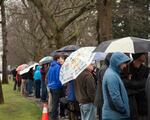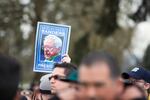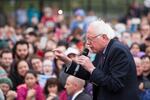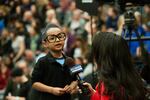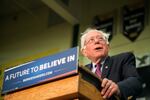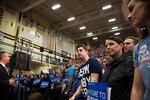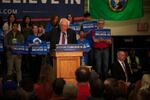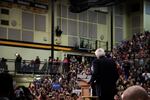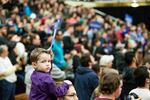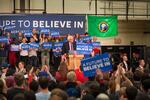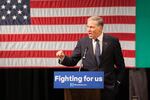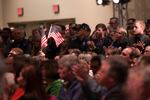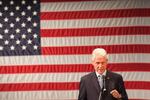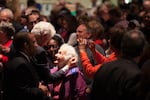Washington’s Democratic caucus is in play this election cycle meaning voters around the state are getting something unusual: actual face time with presidential candidates.
On Saturday, Democrats in Washington will gather at local schools and community centers to caucus and ultimately decide who they’ll back for president, Vermont Sen. Bernie Sanders or former Secretary of State Hillary Clinton.
Even though Clinton leads in delegates, that hasn’t stopped Sanders from campaigning hard, especially in Washington where support for the Vermont Senator is strong.
Related: Thousands Gather To See Bernie Sanders In Vancouver, Washington
On Sunday, Sanders brought his anti-corporate, pro-middle class message to rallies in Seattle, Spokane and Vancouver.
“Today here in Vancouver, we say to the billionaire class, we say to corporate America, we say to Wall Street, we say no, this country is not going to become an oligarchy, we are a democracy," he told some 5,000 screaming supporters at Hudson's Bay High School.
But not to be outdone, the Clinton campaign dispatched former president Bill Clinton to rallies in Spokane and Vancouver. Sec. Clinton campaigned Tuesday in Seattle, Everett and elsewhere around Puget Sound.
“I know that the caucus on Saturday here in Washington is an important milestone on this path to the nomination and the election and I am well aware that we have to work hard between now and Saturday to convince people in Washington," Clinton told a crowd at Rainier Beach High School in Seattle.
Whatever you think of the candidates, the fact that they're campaigning in Washington at all shows the Democrat's primary contest is still being waged.
“Usually what we get is the candidates come here, they do fundraisers they get money and that’s sort of it," said Todd Donovan, who teaches political science at Western Washington University. "This is a level of campaigning between the two candidates that probably exceeds Obama vs. Clinton in 2008.”
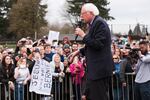
Presidential hopeful Bernie Sanders spoke to a crowd of supporters outside of Hudson's Bay High School in Vancouver, Washington. It was one of three campaign stops the Vermont Senator had in Washington Sunday.
Bryan M. Vance / OPB
Donovan said it’s especially interesting since Clinton appears to have the Democratic race “locked up.” In order for Sanders to get the nomination, Donovan said he would need to win super majorities in Washington and every remaining contest. Even then that might not be enough to get Sanders all the delegates he needs.
Richard Rogers, chair of the Clark County Democrats, said the caucus is basically a neighborhood meeting for Democrats.
“They’ll all sit at a table, all the neighbors from this precinct and they’ll have a discussion. Do they want to vote for Hillary or do they vote for Bernie?," Rogers said. "Then they’ll actually take a vote and elect delegates to go to the county convention."
At the national convention, Washington Democrats will award their 101 delegates proportionally. The state’s party has another 17 super delegates held by the party’s top elected officials; folks like Gov. Jay Inslee and members of Washington’s congressional delegation. The state’s super delegates aren’t bound to the caucus results and almost all have already pledged their support to Clinton.
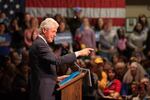
Former President Bill Clinton speaks at Clark College in Vancouver, Washington, during a campaign rally for former Secretary of State Hillary Clinton on March 21, 2016.
Bradley W. Parks / OPB
"A lot of people just assumed Hillary Clinton was just going to become the nominee," Rogers said. "I think Bernie's candidacy is needed and I'm glad that we have it because it directs the conversation to a more balanced view of the far left and the central middle, I guess is what I'd call it. I think it kind of what we need to have the dialogue go forward."
Rodgers expects the caucus to be full of energetic, if not down right passionate discussions between Sanders and Clinton supporters.
Washington’s democratic caucus start Saturday at 10:30 a.m.
Democrats in Washington will caucus on Saturday. And then, in May, they can vote for their party’s presidential nominee all over again in the state’s primary. Only the caucuses actually count in the Democratic presidential race. Republican delegates, though, will be awarded solely through the state’s primary.
How did Washington get this dual system? All Things Considered host Kate Davidson spoke with Dave Ammons of Washington’s Secretary of State office to find out. To hear their conversation, click play in the audio player at the top of this article.

